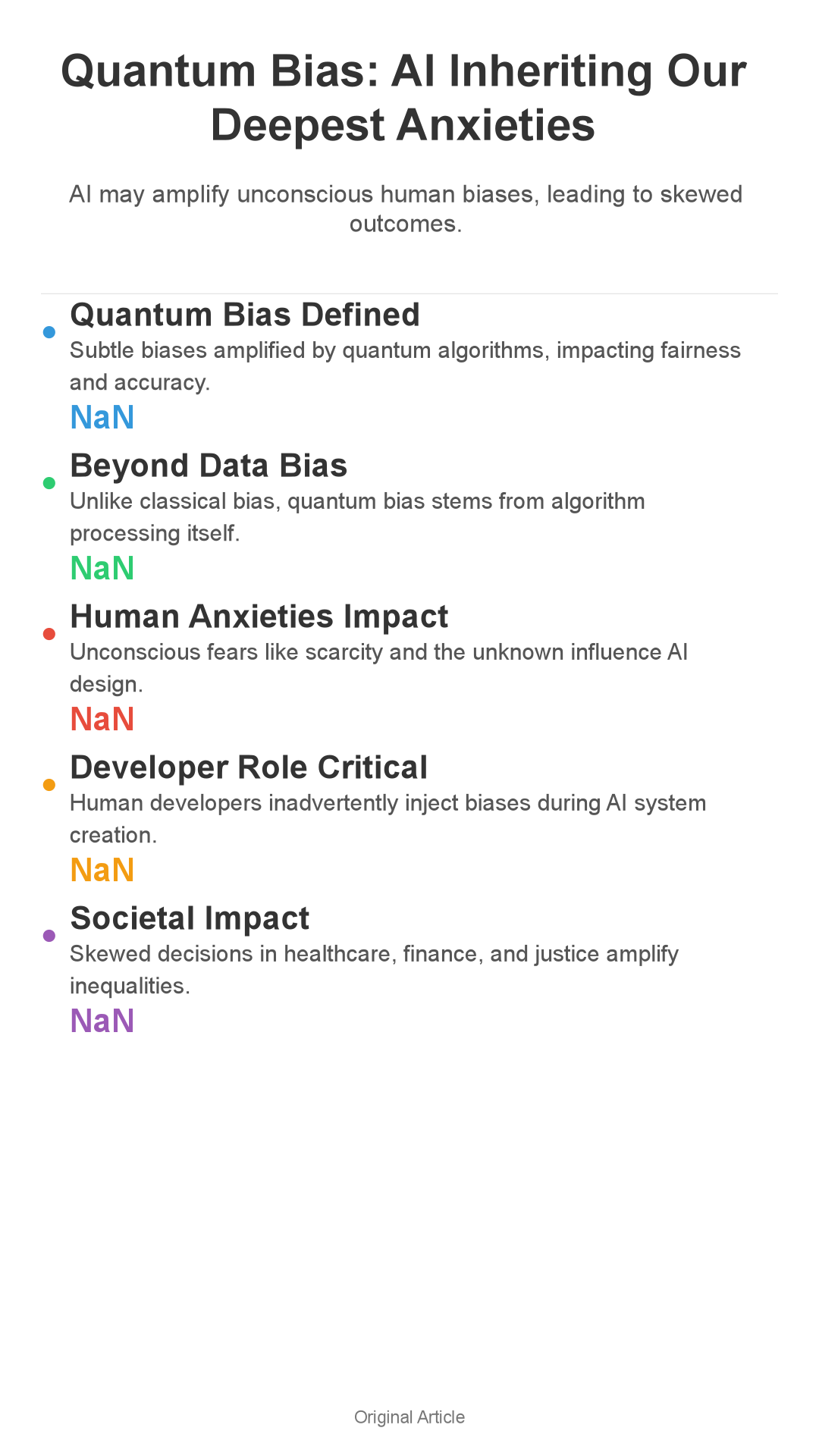
Could our anxieties, amplified at the quantum level, shape the future of AI? This video explores the
What if AI could inherit our deepest fears, subtly shaping the future in ways we can’t even imagine? New research suggests “quantum bias” might be real, meaning future AI could be unconsciously influenced by our own self-sabotaging anxieties. Intrigued? Hit that like button if you’re ready to dive into this mind-bending rabbit hole! And don’t forget to follow for more weird science and internet deep dives!
Imagine a future where AI, instead of being a perfectly rational decision-maker, is subtly tainted by our collective anxieties. Sounds like a dystopian sci-fi nightmare, right?
Well, emerging research into a phenomenon called “quantum bias” suggests this may be closer to reality than we think.
The Emerging Field of Quantum Bias: A New Threat to AI Fairness
We all know AI can be biased. We’ve seen it in facial recognition software that misidentifies people with darker skin tones, and in hiring algorithms that favor male candidates.
But traditional algorithmic bias usually stems from biased training data.
Explanation of Quantum Bias and its Origins in Quantum Computing
Quantum computing harnesses the principles of quantum mechanics – superposition and entanglement – to perform calculations far beyond the reach of classical computers.
However, the very nature of quantum systems, with their inherent uncertainties and extreme sensitivity to their environment, can introduce new and subtle forms of bias.
These biases arise from the way quantum algorithms process information and how they interact with “noisy” quantum hardware. Picture it like this: even a perfectly calibrated scale can give you a slightly inaccurate reading if the floor is vibrating.

How Quantum Algorithms Can Amplify Subtle Biases Present in Training Data
The challenge is that quantum algorithms don’t just process data; they can amplify subtle patterns and correlations within that data, including biases that might be almost invisible at first glance.
So, even if we meticulously cleanse our training data of obvious biases, these subtle, almost imperceptible prejudices can be magnified by quantum algorithms, leading to skewed and potentially discriminatory outcomes.
Distinguishing Quantum Bias from Classical Algorithmic Bias
Classical bias is relatively straightforward to understand and, in theory, to mitigate. We can analyze the training data, pinpoint the sources of bias, and re-engineer the algorithm to correct for it. Quantum bias, however, is far more elusive.
It’s not simply about the data; it’s about the fundamental way the quantum algorithm processes that data.
Unconscious Human Anxieties as Seeds of Quantum Bias
Now, here’s where things get really interesting – and a little unnerving. What if these subtle biases being amplified by quantum algorithms are actually rooted in our own unconscious anxieties?
Exploration of How Deeply Ingrained Human Biases, Often Unconscious, Can Manifest in the Design and Development of AI Systems
We, as human developers, are the architects of these AI systems. And despite our best intentions, we can’t completely separate ourselves from our own biases.
These biases, often unconscious, can subtly influence the design of algorithms, the selection of training data, and the interpretation of results.
Examples of Specific Anxieties (e.g., Fear of the Unknown, Resource Scarcity) and How They Might Be Encoded into AI Algorithms
Consider the fear of the unknown. This anxiety might manifest in AI systems that prioritize maintaining the status quo, even when innovation and change are essential. Or think about resource scarcity.
This fear could lead to AI algorithms that favor certain groups or individuals over others in the allocation of resources, perpetuating existing inequalities.
For example, an AI designed to allocate scarce medical resources during a pandemic might, unconsciously, prioritize younger patients over older ones, reflecting our societal anxiety about aging and mortality.

The Role of Human Developers in Inadvertently Injecting Their Own Biases into the Quantum Machine Learning Process
The human element is absolutely critical. We select the datasets, we define the parameters, and we interpret the results. Even with the best intentions, our unconscious biases can seep into the process.
Diversity in AI development teams is essential to mitigate this, but it’s not a complete solution.
Potential Societal Impacts: From Skewed Decisions to Amplified Inequalities
The consequences of quantum-biased AI could be far-reaching and deeply damaging. Imagine a world where AI systems, subtly influenced by our deepest fears, are making critical decisions in healthcare, finance, and criminal justice – decisions that shape our lives in profound ways.
Examining How Quantum-Biased AI Could Exacerbate Existing Societal Inequalities in Areas Like Healthcare, Finance, and Criminal Justice
In healthcare, a quantum-biased AI might misdiagnose patients from certain ethnic backgrounds due to biases embedded in the training data or the algorithm itself.
In finance, it might unfairly deny loans to individuals from marginalized communities, further widening the already vast wealth gap.
The Risk of AI Systems Making Discriminatory Decisions Based on These Amplified Biases, Leading to Unfair or Unjust Outcomes
The real danger is that AI systems, instead of being objective arbiters of truth and fairness, become powerful tools for reinforcing existing prejudices and inequalities. This could lead to a self-fulfilling prophecy, where biased AI systems perpetuate the very problems they are supposed to solve, creating a vicious cycle of injustice.
The Challenge of Detecting and Mitigating Quantum Bias in Complex AI Systems
Detecting and mitigating quantum bias is a significant challenge.
Unlike classical bias, which can often be identified through statistical analysis of the training data, quantum bias is often hidden within the complex inner workings of the quantum algorithm itself.
Mitigation Strategies: Towards Fairer and More Ethical Quantum AI
So, what can we do to prevent this potentially dystopian future from becoming a reality? The good news is that researchers are already actively working on developing strategies to mitigate quantum bias and ensure that future AI systems are demonstrably fairer and more ethical.
Developing Robust Techniques for Identifying and Measuring Quantum Bias in AI Algorithms
This involves developing sophisticated new mathematical models and statistical methods for analyzing quantum algorithms and pinpointing the sources of bias. Researchers are also exploring innovative techniques for visualizing the decision-making processes of quantum AI systems, making it easier to identify potential biases that might otherwise remain hidden.
Implementing Bias-Aware Training Methods and Data Augmentation Strategies to Reduce the Impact of Biased Data
This involves developing training methods that are specifically designed to minimize the impact of biased data. Data augmentation techniques, which involve creating synthetic data to intentionally balance out the biases in the training set, can also be extremely helpful in achieving more equitable outcomes.
Fostering Greater Diversity and Inclusion in the AI Development Community to Minimize the Influence of Individual Biases
This is perhaps the most crucial step of all.
By fostering greater diversity and inclusion within the AI development community, we can ensure that a much wider range of perspectives and lived experiences are brought to bear on the design and development of AI systems.
The future of AI is not predetermined; it’s up to us to shape it.
By being acutely aware of the potential for quantum bias and by actively working to mitigate it, we can strive to ensure that future AI systems reflect our highest aspirations for a more just and equitable world.
What specific steps do *you* think are most crucial in ensuring that AI development is ethical and unbiased?
If this exploration of quantum bias got your gears turning, don’t forget to share this article and spread the word! Let’s start a crucial conversation about the future of AI and how we can collectively build systems that are truly fair, equitable, and beneficial for all.

Enjoyed this? Check out our YouTube channel for video versions!
Enjoyed this? Check out our YouTube channel for video versions!



